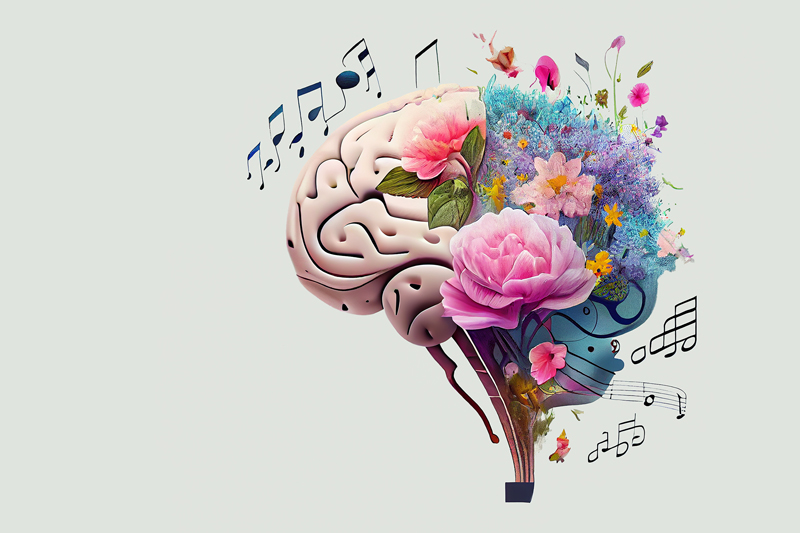Stress, depression, and anxiety are widespread mental health problems in the US today. With our stress levels reported to be among the highest in the world, and more than 40 million American adults experiencing some form of anxiety disorder, it’s clear that improved mental health awareness is an urgent need.
But with trouble and worry constantly brewing around us, how can we promote mental health in our lives and world? There are many ways to reduce stress and anxiety, but one especially beautiful way is through music.
Here’s what you should know about music and mental health, and how music can change our minds for the better.

Mental Health and Music
Listening to music is a common method for many people to relax and de-stress, or to deal with negative feelings like sadness and anxiety. Our instinct to turn to music is a good one—studies have repeatedly demonstrated that music has physiological effects on us that benefit our physical and mental wellbeing. The relationship between music and mental health is an encouraging one; music has been shown to contribute to notable improvements in mental health. The benefits of music on our health also include improvements in:
- Heart rate
- Motor skills
- Brain stimulation
- Immune system enhancement
Music can provide extraordinary benefits in both casual and clinical settings. It can be used in our everyday lives to reduce stress and boost our moods. Studies have shown that music can increase levels of the feel-good chemical dopamine and the “love hormone” oxytocin, and can reduce the stress hormone cortisol. When it comes to music and anxiety, even creating your own playlist and engaging in music on your own can be an effective way to quell anxious thoughts and emotion.
Additional, targeted benefits of music are developed through the use of music in professional clinical settings. The concept of music as medicine promotes music as a tool to treat pain, reduce stress, and otherwise introduce a number of positive health outcomes for patients with depression, Parkinson’s disease, and more. These health benefits are accomplished through music therapy.
What Is Music Therapy?
The Certification Board for Music Therapists (CBMT) defines music therapy as “the clinical and evidence-based use of music interventions to accomplish individualized goals for people of all ages and ability levels within a therapeutic relationship by a credentialed professional who has completed an approved music therapy program.” Qualified professionals are essential in clinical music therapy settings to ensure safety and maximize results.
Music therapy practice is “based on the values of non-maleficence, beneficence, ethical practice; professional integrity, respect, excellence; and diversity.” With these values in mind, musical therapists create music therapy treatment plans that are tailored to their patients’ needs, objectives, and strengths. Treatment may include:
- Music improvisation
- Receptive music listening
- Song writing
- Lyric discussion
- Music and imagery
- Singing
- Music performance
- Learning through music
- Music combined with other arts
- Music-assisted relaxation
- Music-based patient education
- Electronic music technology
- Adapted music intervention
- Movement to music
Here at Levine, we have a full team of board-certified music therapists who are trained to access the therapeutic value of music to help others connect and grow. Our experts work with children and adults of all ages in private and group music therapy sessions using evidence-based practices, helping to forge powerful therapeutic connections between music, health, and wellbeing. In this way, we use music therapy to assist people with a wide variety of needs through offerings at each Levine campus as well as in the community through a variety of partnership programming.
Music therapy for mental health has been demonstrated to have these specific outcomes:
- Reduced muscle tension
- Improved self-image/increased self-esteem
- Decreased anxiety/agitation
- Increased verbalization
- Enhanced interpersonal relationships
- Improved group cohesiveness
- Increased motivation
- Successful and safe emotional release
Music therapy has benefited adults with schizophrenia, substance use disorders, trauma, and depression, as well as veterans with PTSD and traumatic brain injury. It can be used to help children with autism spectrum disorder (ASD), aiding in communication, cognition, behavior, social skills and interaction, and emotional regulation. Older adults with memory disorders can also benefit from music therapy. Because music therapy is so versatile and can cater to specific needs, it’s an incredibly useful and wide-reaching treatment method.
Here at Levine Music, our core values—excellence and opportunity—infuse everything we do. Learn more about our program areas and upcoming performances, and donate today to help us bring lifelong joy and inspiration through music!
